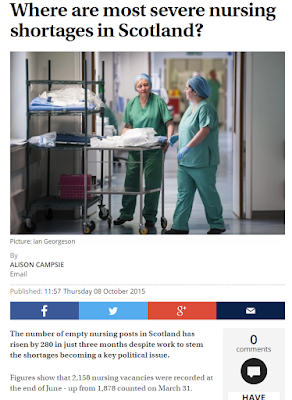The UK parliament issues a report yesterday'
Demography of Scotland and the implications for devolution', copy of which is here
It is a sobering read, it highlights many challenges including our ageing population and lower life expectancy - as demonstrated in the report
A substantial part of the report focused in on Scotland's economic sustainability and growth, in particular the need for migration and ensuring that Scotland has a highly trained/skilled workforce in order to grow business and attract investment.
I was shocked to see SNP's Pete Wishart MP tweet in relation to the report
Err - is he really asking that question? shouldn't the Scottish Government have all the answers and a plan that has seen them implementing strategies over the past 9 years they've been in office? -
It would appear not so let me try and point Mr Wishart on what not to do ....
Firstly there is the appalling attainment gap in our primary schools
here -
only now have the SNP put a plan together to address it, time will tell whither that strategy will succeed but we are looking at another generation of kids that will fail to achieve.
Then there is high school performance league tables
here, which, similar to the primary school tables, shows a clear class divide between the rich and poor, with many schools struggling to get their pupils 5 highers or more which is the amount required for most university places.
Moving up to further education we have seen unprecedented cuts in our colleges
here.
I hear students being unable to complete their two year course as they have been kicked off it after one year by the college so that they can offer the place to school leavers in order to ensure youth unemployment figures remain low, thus they are unable to complete their training and gain their certificates.
Last but not least are our Universities. We have some of the best Universities in the world and rightly they attract a lot of interest from international students. However the number of places for Scots kids are falling as reported
here
Free higher education is still available in Scotland. The Scottish Government however prefer to extend the gift of free University tuition to our European rather than rUK neighbours in the hope it would stimulate migration into the country, the subject of which is mentioned in the report
here
Given that it costs c. £93m p.a.
to provide free higher education to EU domiciles, one would expect the Scottish Government to show the tax payer a return on their investment, however, as demonstrated in the graph, most come to Scotland to study and leave after graduation and there is little 'pay back' for the tax payer.
In order to get official statistics into University outcomes I sent FOIs to the Higher Education Statistics Agency (HESA), details of which is
here (when it came to providing me with the statistical tables HESA preferred to email it to me instead of making it public) and also to the Students Awards Agency for Scotland, details
here.
I asked the HESA for all students who receive free university places in all subjects and also extract EU domiciled specific data. I also asked them to break down the stats to give me those who are studying medicine as we have a shortage of doctors in this country as featured in the BMA
here
I was interested in knowing how many medical students stayed in Scotland after graduation. The figures are shocking and would explain why there is a shortage of doctors.
The HESA tables are quite complicated and needed amalgamating in order to get the full picture.
The HESA data shows a huge increase in the number of EU students from 15,930 in 2009/10 to 20,805 in 2014/15. Not all students qualified and in years 2009-2015 the average pass rate was 35%. The average number of students who stayed and worked in Scotland after finishing University was 3.67%.
The figures detailing our medical schools show that very few EU domiciles stayed to work in Scotland after graduating but it also shows the same applies to Scottish/rUK students.
The results of the amalgamated tables:
Data from the Students Awards Agency for Scotland show that EU domiciled students did not require students loans, which suggests its EU middle classes taking advantage of free tuition.
Is it really too difficult for Pete Wishart and his colleagues to join the dots and see where they've went wrong? It would appear so and I see no evidence that there are coherent plans to put it right.
















































